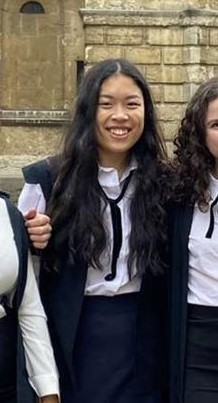
Hi, I’m Amy and I study History and English at St Catherine’s College, Oxford. It’s a small course (there’s only 13 freshers across the whole of Oxford) but it’s a compelling combination if you have an interest in that area of the Humanities. They complement each other but require slightly different skills and approaches, so you can blend together two disciplines without it getting boring or repetitive. It’s also only offered at Oxford, in case you needed any more convincing that Cambridge is inferior.
There’s no step-by-step way to write a personal statement, but the main advice is to make sure that it’s academically-orientated, usually about books that have interested you, and work you’ve done that goes beyond A-level content. As long as you can elaborate on what you found interesting and explain how it helped you engage with your subject better, then the personal statement you produce will be strong. It’s not completely useless to mention extracurricular activities, because universities other than Oxbridge will be interested in those, but anything beyond a sentence or two on that is a waste of word-count. Some degrees may also ask for examples of your written work; because it’s likely that they’ll incorporate those into your interview, you should choose essays on topics that you’re willing to discuss at length. I used my coursework essays, because I’d spent a lot of time on them so I was as secure as I could be with the content.
My interview experience was daunting – but if you feel the same, I promise that feeling won’t be unique to you. There’s no way to completely eliminate nerves, but try to keep in mind that just having an interview is proof that you’ve already impressed your tutor. Your application has convinced them that you have the potential to thrive on your chosen course, so take pride in the fact that you were short-listed. In terms of interview preparation, I would avoid stressing out too much about it. A large part of the interview is seeing how you think on your feet, so interviewers will see through it if you spend ten minutes reciting something pre-learned.
Just make sure you’re comfortable to discuss your personal statement and written work, but keep in mind that they’ll usually only use those as a conversation starter. In both my interviews, I was given an unseen text, so be aware that the tutors will make sure that you’re out of your comfort zone. It’s definitely nerve-wracking because it’s likely the language and content will be unfamiliar to you, but don’t be afraid to make an argument that may not be entirely correct but logical considering the limited information given to you. If the interviewers challenge what you’ve said, they’re not criticising you for being wrong; take it as a sign that they think you’re capable of being pushed further.
My typical week varies. The nature of any joint honours course is that you have to timetable for both sides of your degree, so my weekly schedule is sometimes subject to change. First years are expected to take on four papers, but the distribution of the teaching/completion of those courses throughout the year is up to tutor discretion. I usually have up to two essays a week, and therefore two tutorials to coincide with those. I may also have presentations to prepare for the interdisciplinary classes that are unique to the HENG course. But it’s not as intimidating as it sounds – I take on the same amount of work as a single-honours student, but it’s split between both faculties. There’s no standard formula for organising the term, but they do appreciate your input so will try to be flexible where they can. For example, whereas the other historians completed an entire British Isles paper in Michaelmas, I split mine over two terms to avoid clashes, so you shouldn’t be scared that taking on both subjects will double your workload.
Essentially, History and English is not easy, but it’s definitely a degree that shouldn’t be overlooked. As long as you’re okay with a lot of reading and a lot of essays, you should find it really rewarding.
